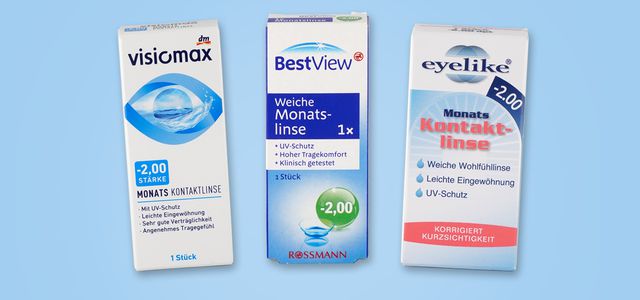
Two contact lenses failed the Öko-Test: The diameters are not exactly right and they do not allow enough oxygen to reach the eyes. However, silicone hydrogel lenses performed particularly well in the test.
Öko-Test tested contact lenses from dm, Rossmann, Mister Spex and other companies in the May 2021 edition. These are soft monthly lenses that stay on your eyes for hours every day.
It is therefore particularly important that the contact lenses allow enough oxygen to reach the eyes. “Too little of it and it can cause damage to the cornea or conjunctivitis, among other things,” warns Öko-Test. The consumer magazine tested 16 soft monthly lenses, including many silicone hydrogel lenses. They let a lot of oxygen into the eyes and also performed significantly better in the test.
Contact lenses in the test: three are test winners at Öko-Test
The silicone hydrogel lenses have the edge in the contact lens test: All tested lenses of this type have been awarded the predicate “very good” or “good”. The three test winners are also silicone hydrogel lenses, for example the Lenscare monthly lenses SH-System Plus (in the test with -2.00 dpt). With them, the values are correct, enough oxygen reaches the eyes and the UV protection also keeps what it promises.
The disadvantage of silicone contact lenses according to the Öko-Test: They are not very elastic and feel a bit dry. Therefore, it takes a while to get used to them. That is why many people prefer to use hydrogel contact lenses (i.e. without silicone polymer). However, none of them were free from defects in the test. After all, two are “good”, but they don’t let as much oxygen into the eyes.
Buy Öko-Test contact lenses as ePaper
Contact lenses from dm and Rossmann put to the test
In this test run, Öko-Test tested two monthly contact lenses from Rossmann and dm. One of the dm lenses failed, one of the Rossmann contact lenses was only “sufficient”. In both cases, it is the hydrogel contact lenses:
- dm Visiomax monthly contact lens: The lenses let too little oxygen into the eyes, criticizes Öko-Test. In addition, the diameter of the contact lenses is different and there is boron in the storage liquid. The test result is therefore “unsatisfactory”.
- Rossmann Best View Soft monthly lenses: The lenses also let too little oxygen into the eyes, writes Öko-Test. So little that two notes were deducted. Since there is also boron in the storage liquid, the contact lenses are only “sufficient”.
As early as 2019, Öko-Test criticized the contact lenses from Rossmann and dm for the same defects. But nothing has changed so far. The Eyelike monthly contact lenses also failed with “poor”. Öko-Test also criticized boron and deviating values for them. In addition, they should not be very permeable to oxygen. Small consolation: the silicone lenses from dm and Rossmann performed better.
Buy Öko-Test contact lenses as ePaper
Contact lens test: the problem with boron
The monthly lenses are in a blister pack and float in a storage liquid. In many cases this liquid contains boron compounds which are used as a buffer to stabilize the pH value. However, boron has come under fire because some compounds can affect fertility. Particularly annoying: only a few manufacturers indicate that the liquid contains boron. Incidentally, this boron-containing storage liquid occurs regardless of the type of contact lens in hydrogel and silicone hydrogel lenses.
Buy Öko-Test contact lenses as ePaper
You can find all the details in the 05/2021 issue of Öko-Test as online at www.ökotest.de.
Read more on Techzle.com:
- Environmental risk contact lenses: This is how lenses become microplastic
- Eye wash: this is how you do an eye wash
- Dry eyes: tips and which home remedies will help